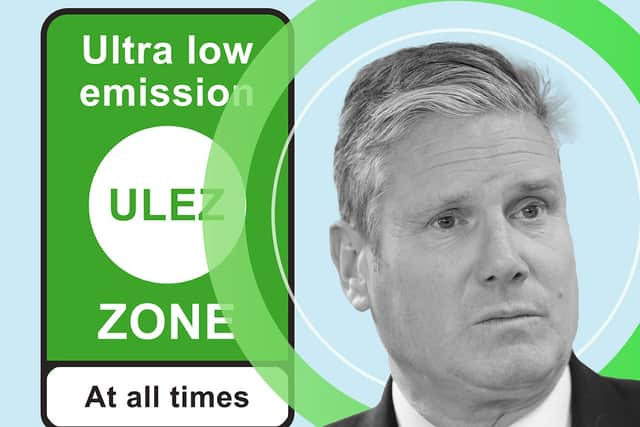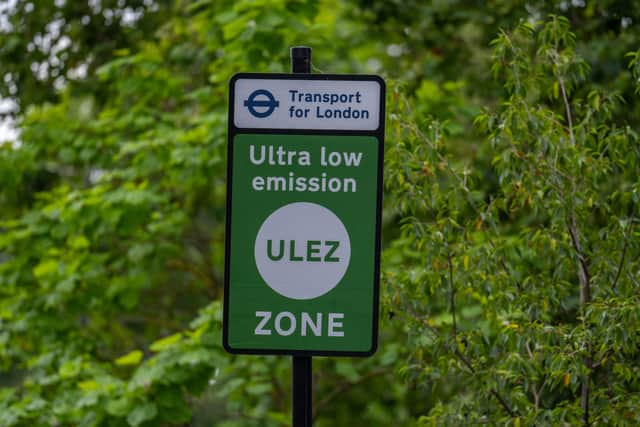Keir Starmer must hold his nerve in the face of ULEZ opposition - but where is that opposition coming from?
and live on Freeview channel 276
Nothing seems to get people fired up quite like hearing their neck of the woods is being turned into a 'low emission' or 'clean air' zone these days - no matter which side of the political spectrum they fall on.
London's oftentimes controversial ULEZ - or ultra low emission zone - expansion is back in the spotlight, after Labour narrowly lost to the Conservatives in a by-election for outer-London seat of Uxbridge on Thursday night (20 July).
Advertisement
Hide AdAdvertisement
Hide AdVictorious Tory MP Steve Tuckwell attributed his success to Sadiq Khan's "damaging and costly" ULEZ expansion plans. The London Mayor has stood by the expansion, saying while he was “disappointed" that the seat - which had never been Labour in his lifetime - didn’t go to his party, he welcomed a 7% swing to Labour and maintained he was "determined to clear the air in London".
Perhaps unsurprisingly to some, Labour leader Keir Starmer seemed mealy-mouthed on the issue. While he did not criticise Mr Khan as he celebrated the party’s success in Selby, he said there needed to be some reflection in the aftermath of the vote.
Sir Keir told reporters the Uxbridge constituency was always going to be “tough”. “We didn’t take it in 1997... and ULEZ was the reason we didn’t win there yesterday,” he said.
“We know that. We heard that on the doors. And we’ve all got to reflect on that, including the mayor.” Asked what “reflect” meant and whether the expansion should be scrapped, he said: “We’ve got to look at the result. The mayor needs to reflect. And it’s too early to say what should happen next.”


What do Britons really think about ULEZ?
Advertisement
Hide AdAdvertisement
Hide AdResearch suggests that in London, more people are in favour of the expansion than are opposed to it. NationalWorld's sister publication LondonWorld reports polling of 1,100 Londoners showed 58% supported the scheme as it stood now, and more than half (52%) believe it had improved air quality in London.
While a large minority backed the expansion to outer London (47%), more than the 32% opposed. Those living in the city’s outer boroughs were evenly split, with 39% responding either way.
Outside of the capital, reactions to ULEZ or similar Clean Air Zone (CAZ) policies have been a bit more of a mixed bag - albeit one somewhat lacking in official data - but it is shaping up to be a hot-button issue in the next election.
Manchester's CAZ has been paused for more than a year at this point, after huge public backlash.
Advertisement
Hide AdAdvertisement
Hide AdIn Bristol, a Clean Air Zone policy covering the city centre and some of the inner suburbs came into effect in November 2022. Bristol City Council estimates 71% of vehicles travelling to the city are already compliant - but the zones operate 24 hours a day, seven days a week, every day of the year.
The scheme has received a mixed response locally - with groups like the Bristol Clean Air Alliance saying it should have happened much sooner, while some residents and businesses insisted the CAZ would have a detrimental impact on their lives.
BristolWorld got a taste of that mixed reaction when reporters visited a South Bristol street split in two by the CAZ, with residents sharing stories of both "gasping for breath" while cycling due to the poor air quality, and the disastrous effect it could have on a local business, which relied on lorries to make deliveries.
Sheffield's controversial CAZ was launched on 27 February. The Star - another of NationalWorld's sister titles - reports there has been much opposition to the scheme, with many fearing it will drive people away from the city centre and damage businesses.
Advertisement
Hide AdAdvertisement
Hide AdAlthough it is billed as a scheme to improve the environment, many saw it as a driving tax and money-making scheme. Some 4,000 people have appealed against fines they have received, with taxi drivers particularly angry - staging a number of protests to fight for support to upgrade their vehicles - and prevent their livelihoods being put at risk.
Up in Scotland, GlasgowWorld reports the city's new low-emission zone only started being enforced on 1 June, and commercial operators have been hardest hit. Taxis in Glasgow, like in most of Scotland, are older vehicles - meaning most of them are not compliant with the new standards, and the industry has struggled to retrofit for less emissions. Wedding chauffeurs and delivery drivers have also been affected.
Broadly the initiative has been supported in the context of measures adopted as Glasgow hosted the COP26 environmental conference, although some exemptions have been allowed to give more time for commercial drivers to comply.


How big a problem is it to motorists really?
A higher percentage of vehicles are compliant - even with London's ULEZ regulations - than many seem to realise.
Advertisement
Hide AdAdvertisement
Hide AdEven in outer London, the London Mayor's office says four out of five vehicles in use already meet ULEZ standards, and the new £110m scrappage scheme will help support disabled and low-income Londoners into new vehicles.
In Birmingham, most petrol vehicles manufactured after 2006 and diesel vehicles manufactured after 2015 are CAZ-compliant. Most commercial vehicles, including 98% of buses and 79% of vans, which do enter the CAZ meet the regulations and are not charged, the council says.
Meanwhile, Bristol City Council estimates 71% of vehicles travelling to the city are already compliant.
Then where has the outrage come from?
This is a harder question to answer, but there are at least a few things that appear to be feeding into it.
Advertisement
Hide AdAdvertisement
Hide AdOne seems to be a failure to effectively - and clearly - communicate the potential benefits to both people's health and to the environment.
The effectiveness of London's ULEZ expansion has often been queried by opposing groups, with many pointing to an independent impact assessment report which found the scheme is estimated to have a minor impact on nitrogen oxide exposure, and negligible impact on PM2.5 - a fine particulate which causes damage to lungs.
But - as TfL noted in its own report on the assessment - while the ULEZ expansion will in some cases make minor or negligible improvements, in absolute terms the impact will be notable.
For example, it states that although the impact on carbon emissions is assessed as negligible, “this equates to a saving of 27,000 tonnes of [carbon dioxide] saved in outer London, which is a comparatively larger saving than we have seen with other similar policy interventions. It is nearly double that which the central London ULEZ achieved in its first year of operation.”
Advertisement
Hide AdAdvertisement
Hide AdThe lack of clear communication is allowing what should be facts to be stoked into a "culture war" issue. Some have also argued scrappage schemes don't go far enough, and will leave older car-owners struggling during a cost of living crisis.
The considerably more fierce opposition outside the capital might in part come from neglect of regional transport links - with some of the most infamous cases up north. After all, why would you ever even consider abandoning your vehicle if there were no other alternatives to get around?
There is plenty that could be done better. Ultimately however, Keir Starmer - who the BBC reports has famously refused to take a side in the dispute - needs to not let a little opposition rattle him, and back party members like Khan who are committing to action on the UK's deadly air pollution issue.
The benefits for ULEZ and CAZs are already there to be seen - toxic nitrogen dioxide levels fall, carbon emissions fall. Less children like Ella Kissi-Debrah get sick and die.
If Starmer wants to show Labour has the strong leadership it needs to succeed, he needs to steel his nerve.
Comment Guidelines
National World encourages reader discussion on our stories. User feedback, insights and back-and-forth exchanges add a rich layer of context to reporting. Please review our Community Guidelines before commenting.
